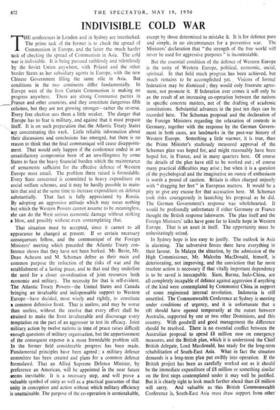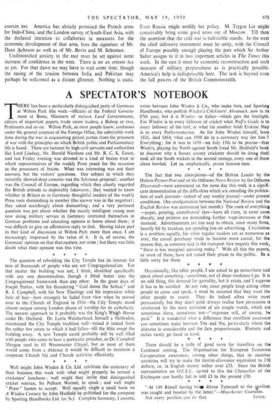INDIVISIBLE COLD WAR
THE conferences in London and in Sydney are interlocked. The prime task of the former is to check the spread of Communism in Europe, and the latter the much harder task of checking the spread of Communism in Asia. The cold war is indivisible. It is being pursued ruthlessly and relentlessly by the Soviet Union anywhere, with Poland and the other border States as her subsidiary agents in Europe, with the new Chinese Government filling the same role in Asia. But conditions in the two continents differ fundamentally. In Europe west of the Iron Curtain Communism is making no progress anywhere. There are strong Communist parties in France and other countries, and they constitute dangerous fifth coluinns, but they are not growing stronger—rather the reverse. Every free election sees them a little weaker. The danger that Europe has to fear is military, and against that it must prepare '-----., itself. It is on such preparation that, the Atlantic Treaty States '''&( concentrating this week. Little reliable information about their discussions and conclusions has emerged, but there is no reason to think that the final communiqué will cause disappoint- ment. That would only happen if the conference ended in an unsatisfactory compromise born of an unwillingness by some States to face the heavy financial burden which the maintenance of armaments sufficient for the effective defence of Western Europe must entail. The problem there raised is formidable. Every State concerned is committed to heavy expenditure on social welfare schemes, and it may be hardly possible to main- tain that and at the same time to increase expenditure on defence substantially. That fact is fully appreciated by Russia. By adopting an aggressive attitude which may mean nothing but which the Western Powers cannot assume to be meaningless, she can do the West serious economic damage without striking a blow, and possibly without even contemplating that.
That situation must be accepted, since it cannot to all appearance be changed at present. If so certain necessary consequences follow, and the communiqué of the Foreign Ministers' meeting which preceded the Atlantic Treaty con- ference shows that they have not been burked. Mr. Bevin, Mr. Dean Acheson and M. Schuman define as their main and common purpose the reduction of the risks of war and the establishment of a lasting peace, and to that end they underline the need for a closer co-ordination of joint resources both economic and military. The necessity for that is self-evident. The Atlantic Treaty Powers—the United States and Canada bringing an invaluable and indispensable support to Western Europe—have decided, most wisely and rightly, to constitute a common defensive front. That is useless, and may be worse than useless, without the resolve that every effort shall be strained to make the front invulnerable and discourage every temptation on the part of an aggressor to test its efficacy. Joint military action by twelve nations in time of peace raises difficult enough questions of military organisation, but the apportionment of the consequent expense is a more formidable problem still. In the former field considerable progress has been made. Fundamental principles have been agreed ; a military defence committee has been created and plans for a common defence formulated. That an Allied Supreme Defence Minister, by preference an American, will be appointed in the near future seems inevitable. It is a necessary step, and will prove a valuable symbol of unity as well as a practical guarantee of that unity in conception and action without which military efficiency is unattainable. The purpose of the co-operation is unmistakable, except by those determined to mistake it. It is for defence pure and simple, in no circumstances for a preventive war. The Ministers' declaration that " the strength of the free world will never be used for aggressive purposes " is incontestable.
But the essential condition of the defence of Western Europe is the unity of Western Europe, political, economic, social, spiritual. In that field much progress has been achieved, but much remains to be accomplished yet. , Visions of formal federation may be dismissed ; they would only frustrate agree- ment, not promote it. If federation ever comes it will only be as the result of an increasing co-operation between the nations in specific concrete matters, not of the drafting of academic constitutions. Substantial advances in the past ten days can be recorded here. The Schuman proposal and the declaration of the Foreign Ministers regarding the relaxation of controls in Germany, together with the response by the German Govern- ment in both cases, are landmarks in the post-war history of Western Europe. Something a little warmer, it is true, than the Prime Minister's studiously measured approval of the Schuman plan was hoped for, and might reasonably have been hoped for, in France, and in many quarters here. Of course the details of the plan have still to be worked out ; of course many practical difficulties may arise ; but when it is a question of the psychological and the imaginative an ounce of enthusiasm is worth a pound of caution. Britain is often charged unjustly with " dragging her feet " in European matters. It would be a pity to give any excuse for that accusation here. M. Schuman took risks courageously in launching his proposal as be did. The German Government's response was wholehearted. It would be profoundly unfortunate if either Germany or France thought the British response lukewarm. The plan itself and the Foreign Ministers' talks have gone far to kindle hope in Western Europe. That is an asset in itself. The opportunity must be unhesitatingly seized.
In Sydney hope is less easy to justify. The outlook in Asia is alarming. The subversive forces there have everything in their favour. In Malaya the situation, by the admission of the High Commissioner, Mr. Malcolm MacDonald, himself, is deteriorating, not improving, and the conviction that far more resolute action is necessary if that vitally important dependency is to be saved is inescapable. Siam, Burma, Indo-China, are all completely incapable of defence against aggression if anything of the kind were contemplated by Communist China in support of some engineered internal revolution. Indonesia is still unsettled. The Commonwealth Conference at Sydney is meeting under conditions of urgency, and it is unfortunate that a rift should have opened temporarily at the outset between Australia, supported by one or two other Dominions, and this country. With goodwill and good management the difference should be resolved. There is no essential conflict between the Australian proposal to spend £8 million now on emergency measures, and the British plan, which it is understood the Chief British delegate, Lord Macdonald, has ready for the long-term rehabilitation of South-East Asia. What in fact the situation demands is a long-term plan put swiftly into operation. If the British project has been as carefully worked out as it should be the immediate expenditure of £8 million or something similar on the first steps contemplated under it may well be justified. But it is clearly right to look much further ahead than £8 million will carry. And valuable as this British Commonwealth Conference is, South-East Asia must draw support from other sources too. America has already promised the French arms for Indo-China, and the London survey of South-East Asia, with the declared intention to collaborate in measures for the economic development of that area, bore the signature of Mr. Dean 4cheson as well as of Mr. Bevin and M. Schuman.
Undiminished anxiety in the east must be set against some increase of confidence in the west. There is no ex oriente lux as yet. For that dawn we may have to wait some time, though the easing of the tension between India and Pakistan may perhaps be welcomed as a distant glimmer. Nothing is static. Even Russia might modify her policy. M. Trygve Lie might conceivably bring some good news out of Moscow. Till then the assertion that the cold war is indivisible stands. In the west the chief defensive instrument must be unity, with the Council of Europe possibly enough playing the part which Sir Arthur Salter assigns to it in two important articles in The Times this week. In the east it must be economic reconstruction and such measure of military preparedness as is practically possible. America's help is indispensable here. The task is beyond even the full powers of the British Commonwealth.











































 Previous page
Previous page